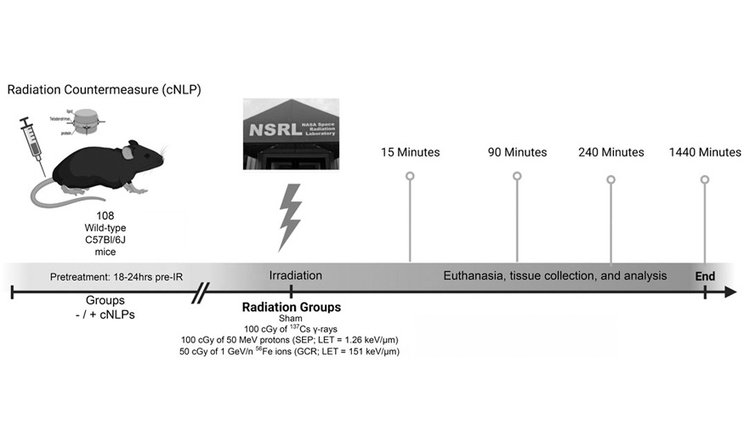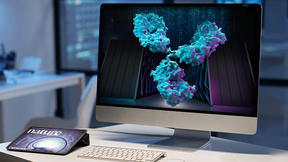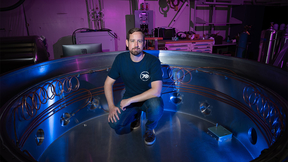Developing radioprotection strategies for deep space exploration
 (Download Image)
(Download Image)
Diagrammatic representation of overall experimental design showing ionizing radiation (IR) exposure schemes, pretreatment of the medical countermeasure, and euthanasia/tissue collection times post-IR at which mice from each IR cohort were euthanized for analyses.
During future missions beyond low Earth orbit (LEO), such as those planned to the moon, near-Earth asteroids, and Mars, astronauts will face poorly defined health risks as a result of exposure to the complex space ionizing radiation (IR) environment. In fact, the gastrointestinal (GI) system is documented to be highly radiosensitive with even relatively low dose IR exposures, capable of inducing mucosal lesions (or ulcers) and disrupting epithelial barrier function. IR is also an established risk factor for colorectal cancer (CRC).
To test novel medical countermeasures (MCMs) to promote astronaut safety, researchers conducted a study where male and female 5–6-week-old mice were exposed to modeled space radiation at the NASA Space Radiation Laboratory (NSRL). The team characterized the GI responses to radiation, as well as the ability of curcumin-laden nanolipoprotein particles, a potential MCM, to provide GI radioprotection. The MCM was injected into the mice 18–24 hours prior to irradiation. The mice were then euthanized at 15 minutes, 90 minutes, 4 hours, and 24 hours post-irradiation, and their small intestines were analyzed.
Overall, the collected data will improve scientific understanding of physiological alterations in the GI tract immediately following exposures to modeled space radiation and demonstrate the effectiveness of a promising space radiation MCM. These results will assist NASA in its efforts in space radiation risk assessment modeling and provide a safe nutraceutical-based MCM to promote astronaut safety during extended deep-space missions.
[J. Diaz, B.M. Kuhlman, G. Balamayooran, N.P. Edenhoffer, A.C. Evans, K.A. Martin, P. Guida, A. Rusek, A. Atala, M.A. Coleman, P.F. Wilson, G. Almeida-Porada, and C.D. Porada, Immediate effects of acute Mars mission equivalent doses of SEP and GCR radiation on the murine gastrointestinal system—protective effects of curcumin-loaded nanolipoprotein particles (cNLPs), Front. Astron. Space Sci. (2023), DOI: 10.3389/fspas.2023.1117811.]
–Physical and Life Sciences Communications Team
Tags
Bioscience and BioengineeringBiosciences and Biotechnology
Physical and Life Sciences
Featured Articles







